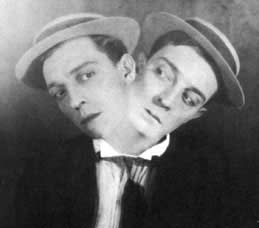
Prologue:

Setting the Stage
On December 23, 1919, Buster Keaton - fresh from his apprenticeship with Roscoe "Fatty" Arbuckle, where he soaked up everything he could about movie comedy - signed an agreement with producer Joseph Schenck that led to the formation of Buster Keaton Productions, housed in the studio formerly used by Charlie Chaplin to make his classic two-reeler Mutual comedies. Or, as Keaton more simply put it, Schenck "just turned me loose."
Keaton never said, or allowed anyone to say, a bad word about Schenck, though he maintained more control over Keaton's movies than Keaton cared to admit, and he eventually pulled the rug out from under Keaton eight years later. That said, we can at least be grateful for the eight years in which Schenck gave Keaton relative freedom. For in that time period emerged thirty of some of the most remarkable American comedies ever made, and an eternally lasting movie persona: Buster, The Great Stone Face, whose stoicism helped him to weather mankind's greatest calamities and inhumanities.
Of those movies, there is only one - Keaton's penultimate independent feature, College - that is arguably of little or no merit. Of the remainder, even the more so-so of these comedies has at least a few comic treasures to offer. And when Keaton is at the top of his game - as he is in Cops, Sherlock Jr., and The General, to name just three - there is nothing greater to be found in movie comedy.
My Apologia
This is in no way an in-depth or scholarly study of Buster Keaton's early movies; there are books that are far superior to this website for that purpose. (I have listed some of those books on this website's bibliography page.)
But as a local movie critic and feverish Keaton buff, I believe that my critiques of his movies are as insightful as anyone's. I hope you will take them in that spirit.
Political Incorrectness
One potential land-mine should be addressed at the outset. As was the unfortunate style of his time, Keaton often dealt in humor now regarded as racist, most notably with African-Americans. Movies such as The Playhouse, Neighbors, The Three Ages, Seven Chances, Steamboat Bill Jr., and especially College derive some or much of their humor from black stereotypes - blackface, fear of ghosts, etc.
Not being African-American myself, I don't pretend to gauge blacks' reactions to such "jokes." Nor do I pretend to defend it, except to say I really don't think Keaton intended such material maliciously. As evidence, I offer his short The Paleface which, while mainly comedic, also offers a rare sympathetic look at the plight of Native Americans. The man who made that comedy can't be all bad.
Keaton vs. Chaplin - Who cares??
Ever since I was a kid, I have been listening to the ridiculous debate about Charlie Chaplin versus Buster Keaton - which comic is funnier, less sentimental, more artistic, etc. - as though great movie comics are so plentiful that we must compare apples to oranges. For the final word on this subject, I have two quotes: One from The Silent Clowns, a priceless study of silent-movie comedy by the late critic Walter Kerr, the second a seemingly irrelevant quote about a completely different subject by Susan Sontag. (However, in Sontag's case, replace "The Doors and Dostoyevsky" with "Chaplin and Keaton," and you'll see what I mean.)
* "...[Keaton] has been hailed, here and there, not only as Chaplin's equal but as Chaplin's superior. This, I think, is waste effort, a misreading of Keaton's very values...Let Chaplin be king, and Keaton court jester. The king effectively rules, the jester tells the truth." - Walter Kerr, 1975
* "If I had to choose between the Doors and Dostoyevsky, then - of course - I'd choose Dostoyevsky. But do I have to choose?" - Susan Sontag, 1996
And Now, Our Feature Presentation
I welcome any comments or criticisms. Please feel free to E-mail me at TheLoveNest95@gmail.com. Now, on with the show!
- Steve Bailey, Webmaster
Go to: